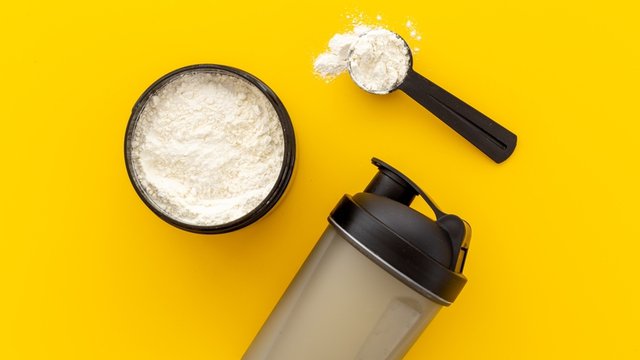
What supplements should athletes take?
Edited on Feb. 28, 2024

Sports supplementation has become a widely discussed topic of general interest due to the importance of physical activity and wellbeing in today's society. The quest for optimal performance, the availability of information, the influence of social media and the development of the industry are key factors that have contributed to the popularity and relevance of the topic.
In this post, we will focus on what sports supplementation is, and which are the most popular sports supplements among athletes and what they are used for.
And if you would like to deepen your knowledge further or you are thinking of a career helping athletes reach their full potential, you could consider a Master in Sports Nutrition Online or a Sports Nutrition Master Real Madrid.
What are sport supplements?
Sports supplementation refers to the strategic use of certain products to supplement an athlete's regular diet. Its main purpose is to provide additional nutrients that may be difficult to obtain through conventional food alone, especially when these individuals undergo intense physical training.
These sports supplements are designed to meet the energy needs of athletes, whether to enhance sports performance, accelerate return to play or address particular nutritional deficiencies. Sports supplementation has become increasingly common among those seeking to maximise their efforts in the gym, on the playing field or in any physical activity.
It should be noted that sports supplementation should not replace a balanced and nutritious diet. Rather, it should be used as a strategic supplement to ensure that the body receives the nutrients it needs to achieve peak performance and recover efficiently after exercise.
Types of sports supplements
There are different types of sports supplements, each with specific purposes and benefits:
Protein
Protein is used to support muscle growth, accelerate recovery and maintain optimal protein balance. This type of sports supplementation helps to achieve an adequate intake of this macronutrient.
- Examples: whey, casein and vegetable proteins.
Amino acids
Amino acids are the building blocks of proteins. Amino acid supplements are known to enhance protein synthesis, reduce muscle fatigue and promote endurance. They are ideal for optimising performance and recovery during and after exercise.
- Examples: BCAAs (Branched Chain Amino Acids) and glutamine.
Creatine
Creatine is a sports supplementation used to enhance the body's ability to produce energy during intense, short-duration efforts. This supplement is ideal for explosive activities such as weightlifting and sprinting, contributing to muscle power and endurance.
- Example: creatine monohydrate.
Vitamins and minerals
Vitamin and mineral supplements are essential for optimal body function. Athletes sometimes have increased requirements due to the intensity of their training and the competitions they participate in, and this type of sports supplementation helps them to maintain good health conditions and strengthen the immune system.
- Example: multivitamins.
Fat burners
Fat burners are sports supplements designed to increase metabolism and fat oxidation. They contain ingredients, such as caffeine, L-carnitine and plant extracts, that help accelerate calorie burning and improve body composition.
- Example: thermogenics.
Pre-workouts
These sports supplements are designed to increase energy and concentration before training. They usually contain caffeine, amino acids and other ingredients to improve performance and endurance during physical activity.
Post-workout support
This type of sports supplementation usually combines quick-release proteins, carbohydrates and electrolytes in specific ratios to optimise post-exercise recovery. They help replenish glycogen, reduce muscle damage and improve protein biosynthesis, accelerating muscle recovery between training sessions.
The choice of a particular sports supplement will depend on the individual goals, the type of physical activity and the specific nutritional and health needs of each athlete.
How to choose the right sports supplementation?
Here are some practical tips for selecting the right sports supplementation for you:
- Know your goals so you can select supplements that best align with your specific needs.
- Consult with a health professional or sports nutritionist. These experts can assess your overall health, identify potential nutritional deficiencies, and provide personalised guidance on the supplements that are right for you.
- Assess your current diet for deficiencies in essential nutrients. If so, incorporating certain supplements may help you meet those needs.
- Research and compare the brands available on the market. Pay attention to their reputation, transparency of product information and quality of ingredients. Opting for well-known and trusted companies provides some assurance that the sports supplementation is of quality.
- Read the label and ingredients of sports supplements carefully. Make sure you understand what you are consuming and in what quantities. Avoid products with unnecessary ingredients or artificial additives that provide no nutritional value. Especially if you are an athlete competing under an anti-doping code, you may run the risk of ingesting a banned product.
- Choose a sports supplement that is compatible with your food intolerances or allergies if you have them. Some sports supplements may contain common allergens such as gluten, lactose or nuts. Read labels carefully to avoid possible adverse reactions.
- Observe dosage and intake recommendations. Avoid exceeding the recommended doses, as this does not guarantee additional benefits and may lead to unwanted side effects.
- Pay attention to how your body responds once you have incorporated sports supplementation into your routine. If you experience negative effects or do not notice improvements in your performance, you may need to adjust your choice or consult an expert again.
In summary, sports supplementation is an essential ally on the road to optimal performance and the achievement of sporting goals. From protein to vitamins and minerals, the variety of supplements available is extensive, offering options tailored to various needs. By understanding the different types and following informed criteria when choosing, athletes can strategically customise their nutritional approach.
Article published on Dec. 22, 2023